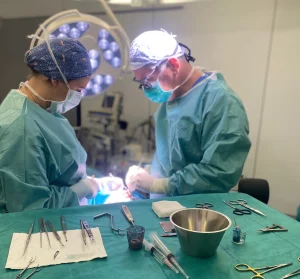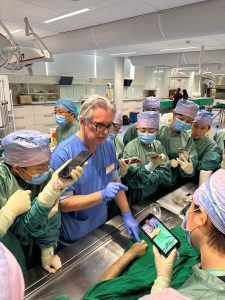What is the difference between a Plastic Surgeon and an Aesthetic or Cosmetic Doctor?
1. What is the difference between a “Plastic Surgeon” and an “Aesthetic or Cosmetic Doctor/Surgeon?”
- “Plastic Surgeon” is a legally protected title that can only be used by doctors who, after completing their 6-year medical degree, have undergone an additional 6-year university specialization in plastic surgery. This title serves as a quality guarantee within the field of plastic surgery.
- “Cosmetic/Aesthetic Doctor/Surgeon” on the other hand, is not an official or protected title. Any doctor can use this title, regardless of their education or experience.
2. Why is this difference important? Who is allowed to perform aesthetic treatments?
Non-doctors (beauticians, nurses, hairdressers, etc.)
- Non-doctors are not allowed to perform medical procedures like Botox, fillers, dermaroller, plasma lift, thread lifts, deep peels, tattoo removal, etc. — even under a doctor’s supervision. This was reaffirmed by the High Health Council in June 2022. Medical needling (with needles of a certain depth) is also strictly reserved for doctors.
- If non-doctors still perform these procedures, it is illegal. As a “patient,” you are then left completely on your own. Be cautious and always choose a qualified doctor for these treatments.
… But can any doctor perform aesthetic treatments?
Which doctors are allowed to perform aesthetic treatments?
- A “Plastic Surgeon” is the only doctor who can perform both surgical and non-surgical aesthetic treatments on the entire body. Surgical procedures include, for example, eyelid corrections, while non-surgical treatments include wrinkle injections with fillers or muscle relaxers.
- Other medical specialists can also offer aesthetic surgery, but only within their specific area of expertise. For example, an ophthalmologist (eye doctor) may only perform procedures around the eyes, such as eyelid surgery, but cannot perform a breast augmentation.
- A “Dermatologist” is qualified to perform non-surgical aesthetic treatments on the entire body, along with some specific surgical procedures.
- A “Cosmetic/Aesthetic Doctor” who is a general practitioner (GP) or basic doctor may only perform non-surgical aesthetic treatments across the body. In most cases, they are not allowed to perform surgical procedures such as eyelid corrections or breast augmentations.
How do I recognize a certified Plastic Surgeon?
A real “Plastic Surgeon” has an RIZIV number ending in 210. You can verify this number for Belgian plastic surgeons on the RIZIV website. This number is often also listed on the plastic surgeon’s website.
You can also search by name on the European website Real Plastic Surgeon.
3. Is it really important to check this? What are the risks for me as a patient?
Yes — the consequences of choosing the wrong practitioner can be very serious:
- An unqualified practitioner may lack the necessary knowledge and experience, leading to incorrect or poorly executed treatments.
- They will not be insured for such procedures. Doctors or other care providers (such as beauticians or nurses) who operate outside their legal authority will never be covered by liability insurance for these treatments.
- An unqualified practitioner may not know how to handle complications, leaving you stranded if something goes wrong.
- Be extra careful if you seek aesthetic treatments outside of Europe. The title “Plastic Surgeon” is protected in Europe, but this isn’t always the case in other countries.
Our advice
✔️ Always check the official title of your practitioner and ensure they have the right specialization, experience, and training for aesthetic treatments.
✔️ Is your doctor a “Plastic Surgeon” or a GP/Specialist with a special interest in “aesthetic treatments” (cosmetic doctor/surgeon)?
✔️ If you choose a cosmetic doctor, do extra research into their experience and training. Some cosmetic doctors have years of experience and regularly attend advanced training, while others may have only attended a single workshop and lack relevant expertise.
✔️ A plastic surgeon offers the added advantage of being able to perform surgical procedures — such as an eyelid correction — if wrinkle injections are no longer sufficient. Additionally, plastic surgeons have specialized training in scar treatment.
Do you have any questions?
Would you like to discuss whether this treatment could be right for you?
Then make your non-binding appointment for a consultation at our clinic.



